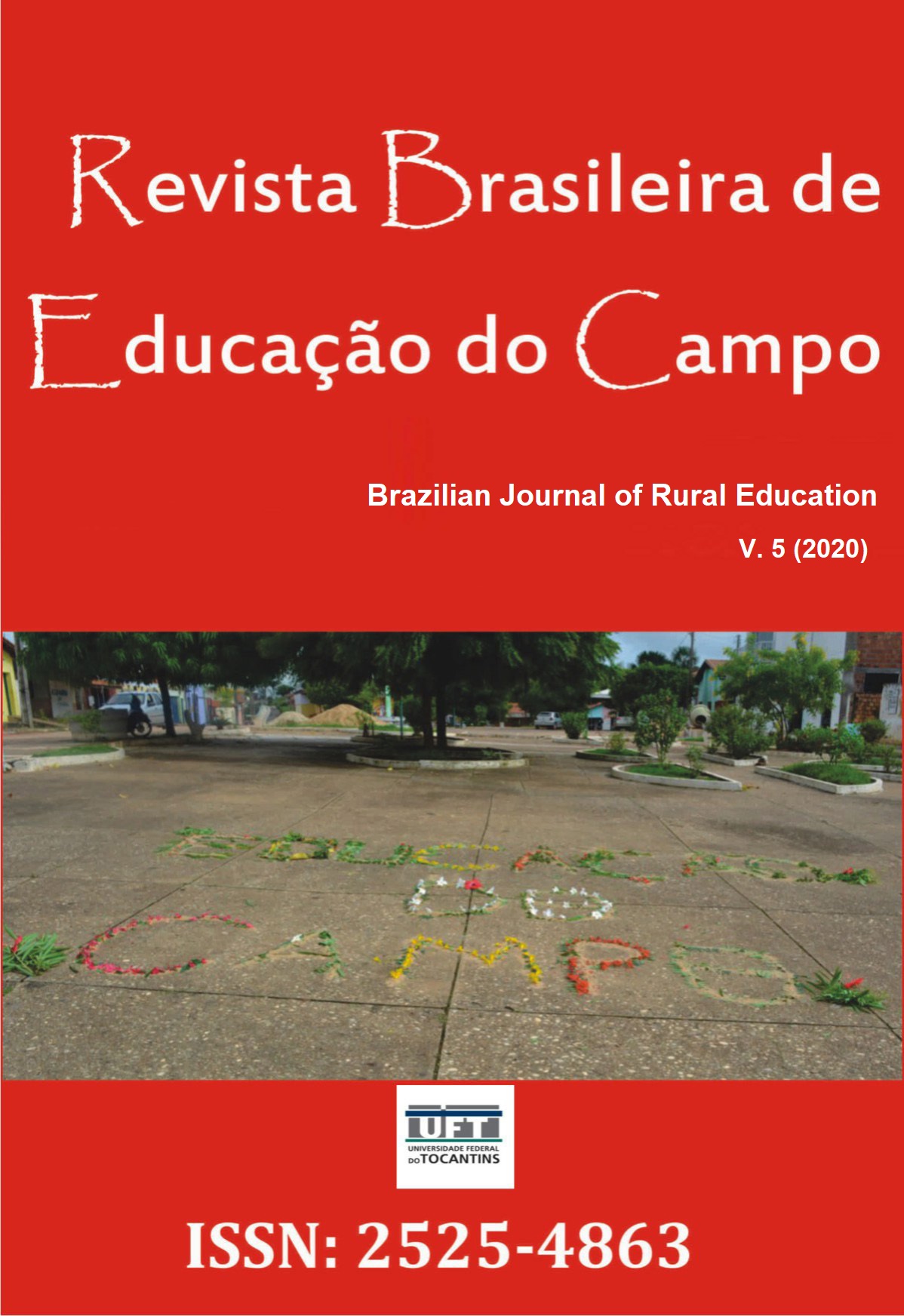Fotos de Educación del Campo: imágenes sobre los caminos que conducen a la escuela en la Amazonia Paraense
DOI:
https://doi.org/10.20873/uft.rbec.e9752Palabras clave:
Educación rural, , Infancia y Escuela, Realidad amazónicaResumen
RESUMEN: Este artículo presenta las discusiones sobre las imágenes de los caminos que conducen a las Escuelas del Campo en la Amazonía Paraense. Para esto, analiza los significados construidos por los niños en Educación Infantil en los caminos que los conducen a la escuela. La base teórica se basa, especialmente, en Caldart (2004), Molina y Sá (2011) y Hage (2005). Metodológicamente, presenta un enfoque cualitativo en el campo psicosocial, en un movimiento dialéctico que involucra el mundo objetivo y subjetivo, como un proceso que constituye imágenes y significados construidos. Para el análisis, se consideraron los contextos que rodean la realidad de la Educación en Educación Rural, experimentada por los niños de un municipio en la región amazónica de Pará, y los significados que los niños encuestados atribuyen a este camino a partir de sus dibujos y los argumentos que justifican imágenes de los caminos que conducen a la escuela. Los resultados revelaron el movimiento dialéctico intersubjetivo, que constituye y construye la realidad de los valores que impresionan la ruptura de la dinámica entre la naturaleza y el mundo artificial de la escuela en la dinámica de la realidad de la Amazonía Paraense, destacando la importancia de considerar las subjetividades de los sujetos en el campo como un acto político para proponer sus políticas de formación y educación.
Descargas
Citas
Bonacelli, E. (2011). Carta a um menino que viverá 100 anos. São Paulo, SP: Editora Guarda-chuva.
Caldart, R. S. (2004). Elementos para construção do projeto político e pedagógico da educação do campo: a construção da identidade da educação do campo. Curitiba, PR: Secretaria de Estado da Educação do Paraná.
Carvalho, E. A. de. (2004). A história da educação em Capitão Poço 1950 – 1990. Belém, PA: Grafam gráfica e editora limitada.
Constituição da República Federativa do Brasil. (1988, 05 de outubro). Recuperado de: http://www.senado.gov.br/sf/legislacao/const/
Curry-Lindahl, K. (1972). Ecologia: conservar para sobreviver. São Paulo, SP: Cultrix.
Decreto nº 7.352. (2010, 4 de novembro. Dispõe sobre a política de educação do campo e Programa Nacional de Educação na Reforma Agrária - PRONERA. Recuperado de: http://www2.camara.leg.br/legin/fed/decret/2010/decreto-7352-4-novembro-2010-609343- publicacaooriginal-130614-pe.html
Flusser, V. (1998). Ficções filosóficas. São Paulo, SP: Editora da Universidade de São Paulo.
Freire, P. (1983). Extensão ou comunicação? (7a ed.). Rio de Janeiro, RJ: Paz e Terra.
Hage, S. M. (2005). Educação do campo na Amazônia: retratos de realidade das escolas multisseriadas no Pará. Belém, PA: Gráfica e Editora Gutemberg Ltda.
Hage, S., & Cruz, C. R. (2017). Protagonismo. Precarização e Regulação como referências para análise das Políticas e Práticas em Educação do Campo. RAF, 11(1), 173-186.
Instituto Brasileiro de Geografia e Estatística (IBGE). (2010). Censo demográfico. Rio de Janeiro, RJ: IBGE.
Jodelet, D. (2001). As representações sociais. Rio de Janeiro, RJ: Verj.
Jovchelovitch, S. (1994). Vivendo a vida com os outros: intersubjetividade, espaço público e representações sociais. In Jovchelovitch, S., & Guareschi, P. (Eds.). Textos em representações sociais (pp. 63-85). Petrópolis, RJ: Vozes.
Lei n. 9.394, de 20 de dezembro de 1996. (1996, 23 de dezembro). Estabelece as Diretrizes e Bases da Educação Nacional. Recuperado de: http://www.senado.gov.br/sf/legislacao
Lenartovicz, L. E. (2017). Políticas Públicas da Educação do Campo: contribuições e dilemas. Recuperado de: https://educere.bruc.com.br
Lira Filho, R. (1982). O que é Direito? (11a ed). São Paulo, SP: Editora Brasiliense.
Marková, I. (2003). Dialogicidade e representações sociais e as dinâmicas da mente. Petrópolis: Vozes.
Molina, M. C., & Sá, L. M. (2011). Escola do Campo. In CALDART, Roseli Salete et al (org.). Dicionário da educação do campo (pp. 259-267). Rio de Janeiro, RJ: IESJV; Fiocruz; Expressão Popular.
Moscovici, S. (1978). A representação social da psicanálise. Rio de Janeiro: Zahar.
Pará. Estatística Municipal – Capitão Poço, 2011. Recuperado de: http://iah.iec.pa.gov.br/iah/fulltext/georeferenciamento/capitpoco.pdf
Pinheiro, M. do S. D. (2018). A concepção de educação do campo no cenário das políticas públicas da sociedade brasileira. Recuperado de: https://www.monografias.com/pt/trabalhos915/educacao-campo-politicas/educacao-campo-politicas.shtml
QEdu.org.br. (2017). Censo escolares. Dados do Ideb/Inep. Recuperado de: https://www.qedu.org.br/
Souza, M. A. de, & Santos, F. H. (2007). Educação do Campo: Prática do Professor em Classe Multisseriada. Diálogo Educ., 7(22), 211-227. Recuperado de: http://www2.pucpr.br/reol/index.php/DIALOGO?dd1=1584&dd99=view
Publicado
Cómo citar
Número
Sección
Licencia
Proposal for Copyright Notice Creative Commons
1. Policy Proposal to Open Access Journals
Authors who publish with this journal agree to the following terms:
A. Authors retain copyright and grant the journal right of first publication with the work simultaneously licensed under the Creative Commons Attribution License that allows sharing the work with recognition of its initial publication in this journal.
B. Authors are able to take on additional contracts separately, non-exclusive distribution of the version of the paper published in this journal (ex .: publish in institutional repository or as a book), with an acknowledgment of its initial publication in this journal.
C. Authors are permitted and encouraged to post their work online (eg .: in institutional repositories or on their website) at any point before or during the editorial process, as it can lead to productive exchanges, as well as increase the impact and the citation of published work (See the Effect of Open Access).














